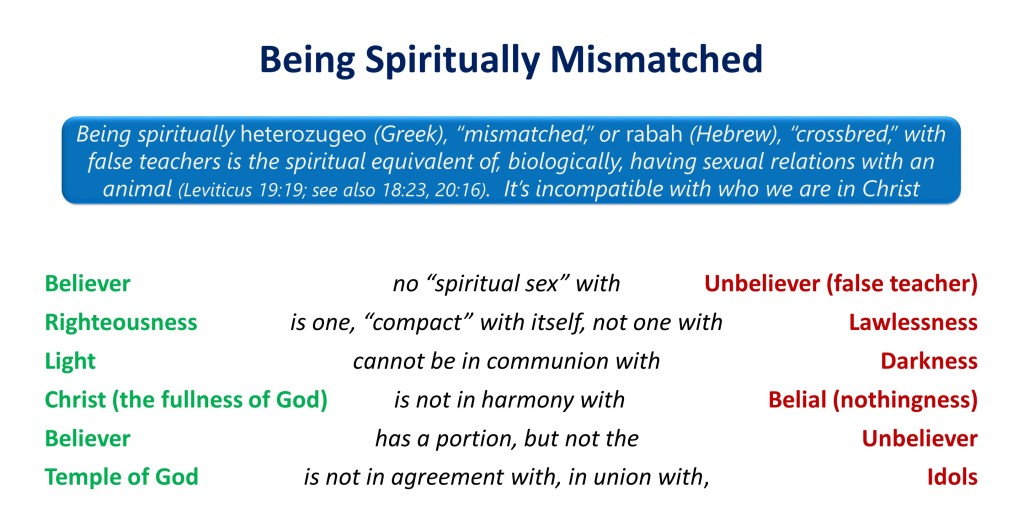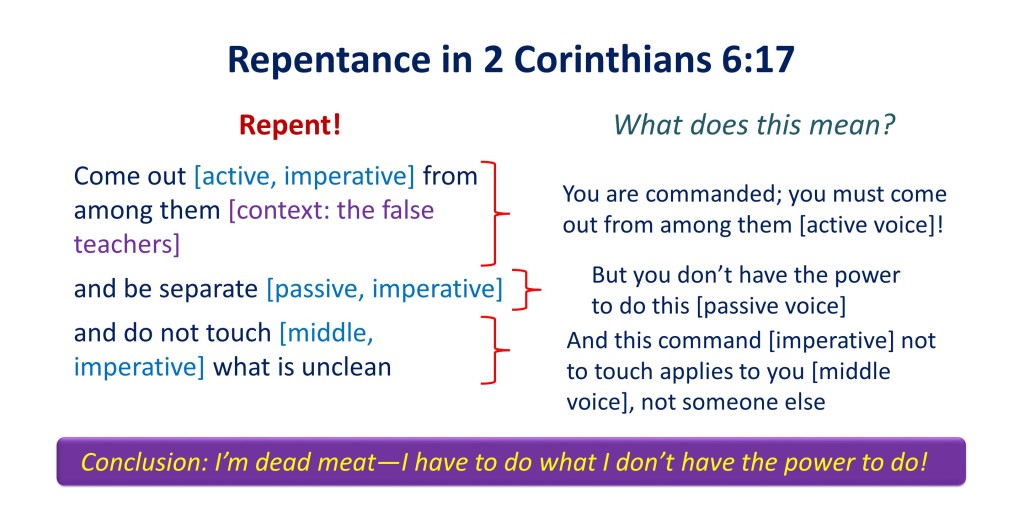 Paul and Timothy had just commanded the Corinthians for their hearts to “be opened” (2 Corinthians 6:13). Although a command, they used a passive voice, showing that the Corinthian Christians didn’t have the power to open their hearts—that was something that was done to them. But the Corinthians did have the ability “restrict” their hearts (2 Corinthians 6:12).
Paul and Timothy had just commanded the Corinthians for their hearts to “be opened” (2 Corinthians 6:13). Although a command, they used a passive voice, showing that the Corinthian Christians didn’t have the power to open their hearts—that was something that was done to them. But the Corinthians did have the ability “restrict” their hearts (2 Corinthians 6:12).
The clear implication is that the Corinthians Christians need to stop listening to the false teachers, who weren’t bringing them what the Corinthians needed for their hearts to “be opened.” But just in case that obvious conclusion does not come to them, Paul and Timothy will now go on to say as much.
Read 2 Corinthians 6:14-16a
- Based on the context, to whom does Paul and Timothy refer when they say, “Do not be unequally yoked with unbelievers”? In other words, who are the “unbelievers” in this verse?
Excursus: The Danger of Understanding a Verse apart from its Context
So far, most of 2 Corinthians has dealt with the false teachers who came to the Corinthian congregation with letters of recommendation. Paul and Timothy then tell the Corinthians to be reconciled to them, not the false teachers (2 Corinthians 5:20). Paul the Timothy then command for their hearts to “be opened” (2 Corinthians 6:11-13). The clear implication is to be open to them, not the false teachers.
And so when Paul and Timothy say, “Do not be unequally yoked with unbelievers,” the unbelievers whom they refer to are the false teachers! It’s not that Christians need to sever relationships with non-Christians. And how do we know that? Earlier in 1 Corinthians, Paul said that if Christians tried to do that they would be forced to “to leave the world” (1 Corinthians 5:10). Instead, Christians were not “to associate with anyone who bears the name of a brother” and is guilty of outward and unrepentant sin (1 Corinthians 5:11)—such as the false teachers in 2 Corinthians.
———–
“unequally yoked”: Greek, heterozugeo, meaning to be mismatched or wrongly matched (It’s the root for our English word, “heterozygote,” an individual who has two different forms of a particular gene). This is the only place this verb is used in the New Testament. We do find it, however, in one place in the Greek-language Old Testament, the Septuagint. In Leviticus 19:19, heterozugeo prohibits mating animals of different species. The Hebrew word is rabah, “crossbreed.” (Leviticus also uses rabah to prohibit people from having sex with animals (18:23, 20:16).
Some see being “unequally yoked” coming from Deuteronomy 22:10, which prohibits harnessing an ox and donkey together to plow a field (Greek, ou arotriao). But by using heterozugeo, Paul and Timothy have something more intimate in mind, which doesn’t forbid working together. Unfortunately, our translation of “unequally yoked” brings with it plowing imagery, making the link to Deuteronomy the obvious choice—if one were to make a connection based on our English translations!
The imagery of trying to mate with another species equates to being one with these false teachers and worshiping with them. We’ll see this in the other contrasts that Paul and Timothy make.
“partnership”: Greek, metoxa. This is another word that’s only found here in the New Testament and only one use in the Septuagint. Psalm 121:3 uses metoxa to refer to Jerusalem as being “compact,” one city bound together. False teachers would ruin this oneness, this compactness.
“fellowship”: Greek, koinonia, communion.
“accord… Belial”: Greek, sumphonesis, where everything is in harmony (it’s where we get our word English word, “symphony”). Belial is from the Hebrew word for “Satan” (beliya‘al), which means “nothingness.” This in the only place where the New Testament uses Belial. This is for good reason.
Earlier, 2 Corinthians referred to Jesus as “the glory of God” (2 Corinthians 4:6). This contrast taps into Hebrew imagery: Glory is denoted by mass, weight, or volume. Jesus, as the “glory of God,” has the “mass” of God while Satan is nothing. That’s why it’s impossible for them to be in harmony.
“portion”: Greek, meris. This is all or nothing; you have a portion or you don’t. We can see this more clearly in these other New-Testament uses of meris:
- Acts 16:12: Philippi was “portion” of Macedonia, which meant is wasn’t a portion of another district within the Roman Empire.
- Acts 8:21: Peter told Simon Magus that he had no “portion” of the Holy Spirit. Simon either had the Holy Spirit or He didn’t.
- Colossians 1:12: Paul and Timothy were thankful that God had given to the Colossians to a “portion” of the inheritance of the saints in light.
“agreement”: Greek, sugkatathesis, agreement, being in union.
Christians are a Temple of a Living God (not of a dead god)
Read 2 Corinthians 6:16b
Here, “we” refers to Paul, Timothy, and the Corinthians Christians (but not the false teachers). Having just told the Corinthian Christians not to be in union with the false teachers, this shows that they are part of the “we,” not just Paul and Timothy.
“the temple”: Here, the text says “a temple,” not “the temple.” This is for a couple of reasons:
- Paul and Timothy were dealing with Judaizers (2 Corinthians 11:22). The Temple was still in Jerusalem, although it no longer fulfilled its intended purpose. Using “a temple” further distanced “the Church” from the Temple.
- Temple is a singular: “We are a temple.” A Christian is bought into a singular entity. He becomes part of a singular; he, however, is not the singular (a person is brought into the Church, he in himself does not become the Church). Thus, the Church changes those who are brought into her, not the other way around.
- Further developing the idea of Christ (fullness) and Belial (nothingness), if we are a temple of “a living God,” who are the false teachers?
Read 2 Corinthians 6:16c-17
Here we find a merging of many scriptural texts: Leviticus 26:12, Ezekiel 37:27 (2 Cor 6:16); Isaiah 52:11 (2 Cor 6:17); 2 Samuel 7:14 (2 Cor 6:18). But this more than cutting and pasting of Old-Testament Scripture; it also includes apostolic adaptation.
- In verse 16, who is the doer and what is He doing?
- In verse 17, what then are the people to do in response to what God is doing?
What God will do in verse 16 is irrespective of what the people do: “He will make His dwelling among them…” In response to God’s unilateral act, the people are then to respond based on that. Note cause and effect. The cause is God; the effect is that the people “come out… be separate… and not touch what is unclean.” And, yet, we find this impossible for the people to do on their own.
But into this hopelessness comes God.
“then I”: The ESV then says, “Then I [God] will…” The previous “ands” in this section were all kais in the Greek. Now, Paul and Timothy use “kago,” which the ESV translates as “then” (I suppose it does this to distinguish it from the previous “ands”). Kago, however, is not a change in time but in emphasis. Is it not, “If you first do this, then after that, I will do…” Instead, kago’s change in emphasis means this: “and I WILL receive you!”
“welcome”: the normal; word for “welcome” is also the word for “receive,” dexomai. But here, that’s not word used. Here, we find eisdexomai, another word found nowhere else in the New Testament. This a word merger of the preposition “into” (eis) and “receive” (dexomai). This is being received into God, not just having His favor. This is being in divine union with Him!
The power to repent comes from God, even though we are involved in the repenting. He also brings us into divine union with Him. God is the Source and the Receiver (A and Z, α and Ω).
This is further explained in verse 18.
Read 2 Corinthians 6:18
- Who is God to us and who are we to Him?
- How do we know this is true? (last part of vs. 18)
“Lord Almighty”: Greek, pantokrator, all-powerful one. Other than Revelation, this is the only place pantocrator appears in the New Testament. Because the Lord is the all-powerful One, He has the power to make a people as His own and to call them to repent from what is false and unclean. And yet, because He is all-powerful, His Word has the power in it to do what it says, making us into His sons and daughters, and bringing us into divine union with Him.
But here’s the quagmire: The false teachers don’t come with the fullness of Christ; they come with the emptiness of Belial, even while claiming to be brothers. Thus, the Corinthians were to be where Christ and His Word came to them, not Belial with his emptiness.
Read 2 Corinthians 7:1
This verse starts out, “Having these promises…” Everything in the verse that follows is because of the promises of God!
- What are these promises that the Corinthians Christians have?
- What are Paul and Timothy doing with the change in tense (I [God] will… having these promises)?
- In this context, what’s the big deal about being separated from what defiles in body and spirit?
“holiness”: Greek, hagiosune, being set apart.
- How are the Corinthian Christians to “complete being set apart in the fear of God”?
Click here to go to the next Lesson.




